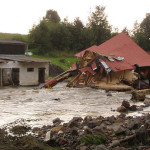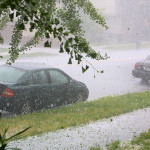Many property insurance policies contain terms that prohibit assignment, but Florida law has long deemed those terms inoperative once a loss has occurred. E.g., W. Fla. Grocery Co. v. Teutonia Fire Ins. Co., 74 Fla. 220 (Fla. 1917). As a result, contractors who repair or remediate damaged property increasingly offer to accept assignments from policyholders in lieu of payment—a practice that gives them greater leverage in setting prices, because it enables them to back ... Keep Reading »
Property
Florida’s Immune System: No First-Party Bad Faith Claims Against The State-Created Property Insurer
Earlier this month, in Citizens Property Insurance Corp. v. Perdido Sun Condominium Association, Inc., No. SC14-185 (Fla. May 14, 2015), the Supreme Court of Florida held that the immunity from suit granted to Citizens under its enabling statute, Fla. Stat. § 627.351(6), applies to the cause of action for an insurer's first-party bad faith that was created by a different statute, Fla. Stat. § 624.155(1)(b). Because Florida does not recognize a common law cause of action ... Keep Reading »
The Eleventh Circuit Holds that for Sinkhole Losses, Structural Damage ≠ Any Damage to a Structure
The land in Florida is prone to sinking and insurance companies must often scramble for solid footing on which to anchor the scope of coverage for sinkhole losses. In Hegel v. First Liberty Insurance Corporation (11th Cir. Feb. 27, 2015), the Eleventh Circuit provided some much needed guidance when it held that the plain meaning of "structural damage" in a homeowners policy cannot be simply "damage to the structure" in the context of determining coverage for a sinkhole ... Keep Reading »
Down in the Dumps: Court Refuses to Apply Pollution Exclusion in Landfill Seepage Case
Claims involving potential coverage for pollution liability pose unique challenges for insurers. In many cases, the polluting activity occurred decades ago and over a large span of time, with only a fraction of the activity occurring during the policy period. As a result, an issue in pollution liability cases is whether an insurer is obligated to indemnify an insured for the entire amount of damages resulting from pollution, or whether an insurer's obligation may be ... Keep Reading »
No Manifestation Destiny: The Seventh Circuit Declines to Set a Standard Trigger Rule for First-Party Property Policies
When I ... feel my finger on your trigger, I know no one can do me no harm." - John Lennon Property damage can be sudden and dramatic, but it can also be subtle and insidious, and that can make it hard to identify the moment when properly coverage is implicated. As a result, courts have recognized several different "triggers," depending on the circumstances of the loss and the type of coverage involved. In November 2014, in Strauss v. Chubb Indemnity Insurance ... Keep Reading »
“At-Issue” Waiver: It Ain’t Over Till It’s Over
When a claim goes south, the insured often pursues a bad faith claim. But even when the bad faith claim settles, that doesn't always mean the litigation is over. And that means it's still necessary to be vigilant about preserving the confidentiality of privileged communications. One way that insurers often waive the privilege inadvertently is by making statements during discovery that put the advice of counsel "at issue." Last month, in Seneca Insurance Co. v. Western ... Keep Reading »
A Unilateral Scrivener’s Error Can Reflect a Mutual Mistake Requiring Policy Reformation (or, Don’t Expect $20 Million in Additional Coverage Without Paying Additional Premium)
It is, of course, an indispensable part of a scrivener's business to verify the accuracy of his copy, word by word. - Herman Melville October 29 marked the second anniversary of Superstorm Sandy's assault on New York and New Jersey. Although the insurance litigation arising from this storm is just beginning, we have already seen a number of decisions out of New York that limited coverage, based on applicable flood sublimits. Last month, in Cammeby's Management ... Keep Reading »
With Sewers Backing Up, Messy Damage Claims are On the Rise
Andy crawled to freedom through five hundred yards of - - - smelling foulness I can't even imagine. Or maybe I just don't want to. Five hundred yards. The length of five football fields. Just shy of half a mile. –The Shawshank Redemption (1994) Many homeowners and other property insurance policies contain an exclusion to address one of the by-products of the increased frequency of severe weather: it bars coverage for property damage caused by "water which backs up ... Keep Reading »
Claims Handlers: It’s Time to Adjust Our Claims!
Many insurers have a longstanding practice of paying claims adjusters a set weekly salary, regardless of the number of hours they actually work. The practice has support in federal labor regulations; the regulations expressly exempt claims adjusters from the overtime requirements of the Fair Labor Standards Act (FLSA), if their duties include discretionary and administrative activities such as interviewing witnesses, inspecting property damage, reviewing information for ... Keep Reading »
Property Insurance Law 101 – A Primer from Texas
On the Fourth of July in 2011, a fire damaged a nightclub in Beaumont, Texas. The fire was not unusual, but the lawsuits it generated—O’Quinn v. General Star Indemnity Company, No. 1:13-CV-471 (E.D. Tex. Aug. 5, 2014), and Debes v. General Star Indemnity Company, No. 09-12-00527 (Tex. Ct. App. July 10, 2014)—review many of the ABCs of property insurance law in the Lone Star State. Everybody Goes to Alibi’s Alibi’s, a nightclub and restaurant, was open nightly from ... Keep Reading »
- « Previous Page
- 1
- …
- 7
- 8
- 9
- 10
- Next Page »









